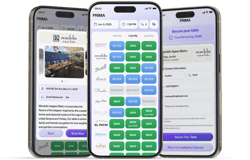WHAT YOU'LL DO:
- Leverage machine learning, deep learning, prompt engineering and data mining technologies to develop AI-driven solutions for healthcare and life sciences.
- Collaborate with domain experts to ensure the relevance and accuracy of data-driven insights.
- Ensure data privacy and security compliance in all data handling and processing activities.
- Evaluate and implement feedback mechanisms to improve AI solutions.
- Develop knowledge graphs and structured data representations to enhance AI-powered insights.
- Develop and maintain data pipelines, integrating multiple data sources, including warehoused and pre-modeled data.
- Interpret and communicate insights and findings through reports, dashboards, and presentations for internal and external audiences.
- Follow software engineering best practices to write clean, reliable, and testable code, supporting rapid delivery via CI/CD and automated deployments.
- Explore new technologies, proof-of-concepts (PoCs), and technical roadmaps.
- Work closely with cross-functional teams to align AI/ML solutions with business needs.
- Estimate technical work for product requests, assisting in roadmap planning and prioritization.
- Champion adherence to technical standards and ensure alignment with architectural direction.
- Identify, track, and minimize technical debt within the team.
- Drive and coordinate incident resolution, root cause analysis, and preventive action implementation.
- Mentor team members, fostering technical growth and skill development in machine learning, NLP, Computer Vision, and AI research.
- Foster a culture of continuous learning, staying up to date on AI technologies, and analytics tools, and industry best practices.
WHAT YOU'LL NEED:
- Master’s degree in Bioinformatics, Statistics, Computer Science, or a related field (PhD preferred). Master’s with 5+ years of relevant experience or PhD with no experience required.
- Strong foundation in Computer Vision, NLP, Machine Learning and AI principles.
- Advanced knowledge of statistical techniques, probability, meta-analysis, multivariate calculus, and linear algebra.
- Strong experience with Python, deep learning frameworks (PyTorch, TensorFlow), and data processing libraries (OpenCV, scikit-learn, pandas). Demonstrated ability to build, fine-tune, and deploy machine learning models, including LLMs, NLP, and predictive analytics solutions.
- Experience deploying and integrating ML models into production environments.
- Hands-on experience with AWS (SageMaker, Bedrock), CI/CD pipelines (Octopus Deploy, Git), and infrastructure-as-code (Terraform).
- Experience in biomedical or healthcare data analysis, integrating multi-modal data (imaging, text, structured data) for comprehensive insights.
- Experience in prompt engineering, Agentic AI (such as Langchain, MCP, Langraph) and transfer learning techniques for LLMs.
- Proficiency in data extraction, transformation, and feature engineering from large, complex datasets.
- Experience with vector databases (e.g., Pinecone, PostgreSQL) for AI applications.
- Familiarity with Graph Neural Networks (GNNs) or knowledge representation techniques. Experience implementing knowledge graphs and structured data models for AI-driven applications.
- Ability to design and validate experiments, interpret results, and draw statistically sound conclusions.
- Proactive, curious, and solution-oriented mindset, with strong ability to prioritize, execute efficiently, and solve complex technical challenges.
- A proactive and curious mindset, with a willingness to explore innovative solutions.
- Strong communication and presentation skills, with the ability to collaborate across teams, mentor colleagues, and document methodologies for knowledge sharing.
- Demonstrated contributions to scientific publications or conference presentations in the life sciences domain.
- Understanding of data privacy, ethics, and regulatory considerations in life sciences (HIPAA, GDPR, etc.).
Top Skills

What We Do
We are a team of dedicated clinical terminologists, data scientists, industry subject matter experts, and informaticists who helped facilitate the evolution from analogue to digital capture of clinical events, the precise code-mapping that simplifies complex workflows, and the translation of unstructured into structured data. We “wrote the digital dictionary” used in every major EHR, and we are leveraging clinical AI to generate insights that expand and deepen our impact across the healthcare ecosystem.
At the end of the day, we don’t make decisions for our clients. We provide them with the digital tools to enable sound decision-making.
Why Work With Us
We are building a clinical intelligence stack—medical ontology, human expertise, and AI—that makes data more useful and more powerful. By enhancing data’s structure, richness, and precision, we reduce noise and error, streamline complexity, and create clarity across the clinical information chain.
Gallery









